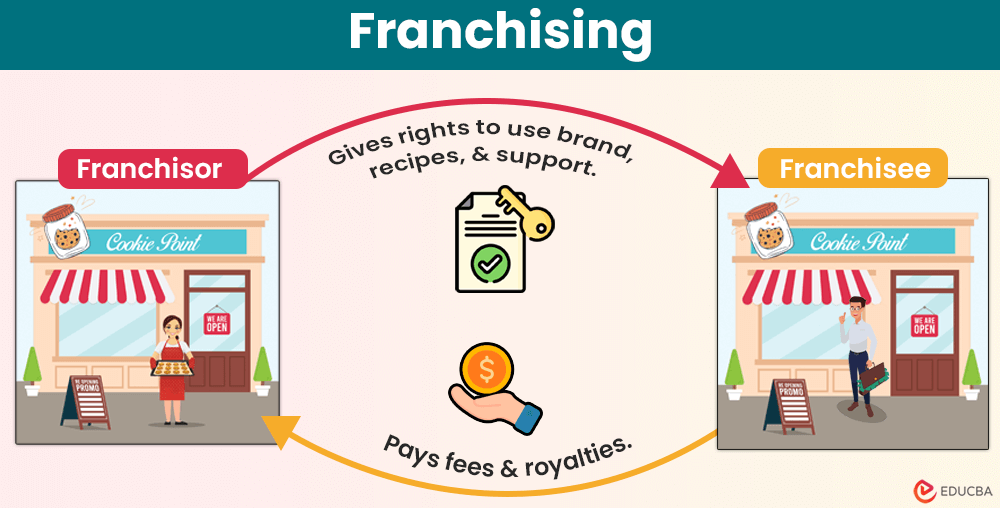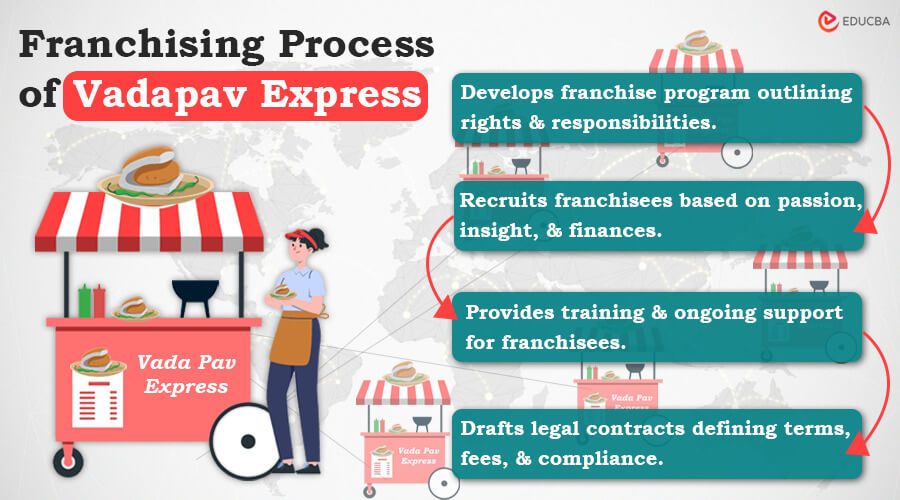What is Franchising?
Franchising is a business partnership where one person (the franchisor) lets another person (the franchisee) use their successful business idea, brand, and support in exchange for fees and royalties.
Imagine yourself making and selling delicious cookies. You have built a popular cookie shop called “Cookie Point.” Now, instead of opening more stores yourself, you decide to franchise. You find someone who wants to run their own business and loves your cookies. They become a franchisee, using your brand, recipes, and support. In return, they pay you fees and royalties. Now, you both win – you expand your Cookie Point brand, and they get a successful cookie business without starting from scratch.
Table of Contents
How Does Franchising Work?
Let us take the example of Vada Pav (a popular Indian street food) to understand how franchising works.
Vada Pav Express is a flourishing Vada Pav stall known for its delicious menu, loyal customer base, and efficient operational system. They decided to venture into franchising to expand their business while minimizing the burden of managing multiple locations.
Franchising Process of Vada Pav Express:
Step 1: Franchise Development
Vada Pav Express began by developing a comprehensive franchise program outlining the franchisor’s and franchisees’ rights and responsibilities. They created a detailed operations manual, providing a step-by-step guide on replicating the Vada Pav Express experience.
Step 2: Franchise Recruitment
Vada Pav Express carefully selected potential franchisees based on their passion for the brand, business acumen, and financial capability. Prospective franchisees underwent a rigorous screening, including interviews, financial checks, and visits to existing Vada Pav Express stalls.
Step 3: Training and Support
Vada Pav Express implemented a thorough training program for new franchisees and their staff to ensure consistency across all franchises. Ongoing support was provided, including regular expert visits, assistance with local marketing strategies, and access to a dedicated support hotline.
Step 4: Legalities and Agreements
Legal contracts were drafted, clearly defining the franchise agreement terms, royalty fees, and the duration of the partnership. Vada Pav Express and the franchisee ensured legal compliance and understanding of their roles.
Results and Success:
Franchising moved Vada Pav Express’s rapid expansion, establishing successful franchises in various cities. The model enhanced brand recognition by ensuring consistent quality and service across all locations. Positive customer experiences at one stall boosted trust and business for others. Economic benefits flowed both ways – franchisees gained from the established brand and support, increasing their likelihood of success. Vada Pav Express generated revenue through franchise fees and royalties and increased supply sales to franchise locations.
Real-Life Examples
1. McDonald’s
McDonald’s is the most well-known fast-food chain worldwide. It has more than 40,275 restaurants in over 100 countries. Ray Kroc joined McDonald’s as a franchise agent in 1955, marking the beginning of McDonald’s transformation of fast food with its standard McDo Menu and fast service. Franchisees run most of its restaurants. McDonald’s keeps evolving by adding new food options to match customers’ tastes.
2. Burger King
Burger King is also a big name in fast food, with over 18,800 restaurants worldwide. It started in 1954 and is famous for its flame-grilled burgers, especially the Whopper. Like McDonald’s, Burger King grows by franchising its restaurants. Franchisees get support from Burger King when running their businesses.
3. Subway
Subway is known for its submarine sandwiches and has over 36,592 locations in over 100 countries. Founded in 1965, it lets customers build their sandwiches. Subway’s simple menu and focus on healthier choices appeal to many. It is popular for people wanting to open a franchise because of its low startup costs and straightforward operations.
4. Wendy’s
Wendy’s has over 7,095 restaurants worldwide. It is famous for its square-shaped burgers and Frosty dessert. Wendy’s began in 1969 and distinguishes itself by using fresh beef. Franchisees appreciate Wendy’s strong brand and support while operating their restaurants.
5. Taco Bell
Taco Bell is a top spot for Mexican-inspired fast food, with more than 8,564 restaurants globally. It was founded in 1962 and is known for items like the Crunchwrap Supreme and Doritos Locos Tacos. Taco Bell’s creative marketing and menu choices have made it a hit. Franchisees benefit from Taco Bell’s proven business model and training.
6. Dunkin’ (formerly Dunkin’ Donuts)
Dunkin’ operates over 13,200 restaurants worldwide, offering coffee, baked goods, and breakfast sandwiches. It started in 1950 and is famous for its coffee. Dunkin’ has expanded its menu beyond donuts to include many options. Franchisees appreciate Dunkin’s strong brand and support in areas like picking a location and advertising.
Types of Franchising
1. Product Distribution Franchise
In this type, the franchisor (the company that owns the brand) gives the franchisee (the person buying the franchise) the right to sell its products. It could be anything from fast food to electronics. The franchisee operates a store or outlet and sells the franchisor’s products.
2. Business Format Franchise
The franchisor provides the products and the entire business format. This includes everything from the brand to methods of operation, training, and support. Franchisees follow a proven business model, often found in fast food or retail industries.
3. Management Franchise
In this type, the franchisor provides the franchisee with a proven business model and ongoing support, but the franchisee is responsible for the day-to-day operations.
4. Single Unit Franchise
It is the most common type of franchise where a person or entity owns and operates one unit of the franchise.
5. Multi-Unit Franchise
In this case, a single franchisee owns and operates multiple franchise units. It could mean owning and managing several fast-food outlets in different locations or multiple stores in a shopping mall.
Advantages of Franchising
Franchising offers several advantages to the franchisor as well as the franchisee. Some of the prominent advantages of franchising are
1. Established Brand Recognition
One significant advantage of franchising is leveraging an established brand name. Franchisees benefit from the reputation and customer loyalty built by the franchisor over time. This brand recognition often leads to easier market penetration and faster customer acceptance than starting a new business from scratch. People tend to trust brands they know well. Having a trust can help franchise owners sell more and make money back quicker.
2. Proven Business Model
Franchise systems typically come with a proven business model that the franchisor has tested and refined. Franchisees receive comprehensive training and ongoing operations, marketing, and management support. Starting a franchise reduces the dangers of beginning a new business because franchisees get a clear plan for success. They can avoid common pitfalls and benefit from the experience and expertise of the franchisor and other franchisees within the network.
3. Economies of Scale
Franchising lets franchise owners enjoy savings when they buy things, advertise, and market because they team up with the larger franchise company. By joining a larger network, franchisees can negotiate better deals with suppliers, access bulk discounts on inventory, and benefit from collective advertising campaigns funded by the franchisor. It enables franchisees to lower operating costs and improve profitability, making franchising an attractive option for aspiring entrepreneurs.
4. Ongoing Support and Guidance
Franchisees get ongoing help and advice from the company they bought into, unlike independent business owners who have to tackle all the challenges of running a business alone. This support may include site selection, lease negotiation, staff training, and ongoing operational support. Franchisees can rely on the franchisor’s expertise and the network of fellow franchisees to address issues as they arise, leading to smoother business operations and higher chances of success.
5. Reduced Risk
Franchising offers a lower-risk pathway to business ownership than starting a new venture independently. Since franchise systems come with a proven track record, franchisees are more likely to succeed. Furthermore, the continuous assistance offered by the franchise owner and the opportunity to connect with other franchise owners help reduce many of the challenges linked with starting a business on your own. It makes franchising appealing to individuals who want to own their business but prefer a structured and supported approach.
Risk of Franchising
1. Financial Risk
One of the foremost risks in franchising is the financial investment required. While the initial franchise fee may seem manageable, additional costs include equipment, inventory, and ongoing royalties. Moreover, success is not guaranteed, and it may take time before the franchise becomes profitable. If the business does not make enough revenue, it could lose money.
2. Brand Reputation
When you invest in a franchise, you are tying your success to the reputation of the franchisor’s brand. If the franchisor faces negative publicity, such as scandals or product recalls, it can tarnish the reputation of all franchisees associated with the brand. It could lead to declining customer trust and patronage, impacting your business’s profitability.
3. Operational Constraints
While franchising provides a proven business model, it also comes with operational constraints. Franchisees must adhere to the franchisor’s rules, regulations, and operational standards, which limits their autonomy in decision-making and business strategies. Additionally, if the franchisor implements unfavorable changes or if there are disagreements between franchisees and the franchisor, it can affect their ability to operate the business effectively.
4. Market Saturation
Investing in a franchise in an oversaturated market poses a significant risk. High competition can lead to a struggle for market share, price wars, and diminished profitability. Conducting thorough market research before investing in a franchise can help mitigate this risk by identifying areas with growth potential and less competition.
5. Legal and Regulatory Compliance
Franchise agreements are official contracts that spell out what both parties have to do and are allowed to do. Violating these agreements or failing to comply with local regulations can result in legal disputes, fines, or even termination of the franchise contract. It is really important to completely understand the rules of the franchise agreement and keep yourself informed about the laws and rules that affect it. It helps you avoid getting into legal problems.
Final Thoughts
Franchising offers a great chance for people to start their own businesses with less risk. However, it is essential to think carefully before jumping in. Partnering with a well-known brand requires dedication, adhering to their rules, and running the business well. Doing these things right can lead to successful franchise ownership.
Frequently Asked Questions (FAQs)
Q1. What is a franchise disclosure document (FDD)?
Answer: The FDD is a legal document the franchisor must provide prospective franchisees. It contains information about the franchise system, costs, legal obligations, and the franchisor’s financial health.
Q2. How does a franchise fee differ from a royalty fee?
Answer: The franchise fee is a single payment the person buying the franchise makes to the company that owns the franchise. This gives them permission to use the brand name and follow the business plan. Royalty fees are ongoing payments, usually calculated as a percentage of the franchisee’s sales, paid regularly to the franchisor.
Q3. How do I choose the right franchise?
Answer: Consider your interests, skills, budget, and market demand. Research different franchises, speak to current franchisees, and thoroughly review the FDD before deciding.
Q4. How long does a franchise agreement typically last?
Answer: Franchise agreements often have a term of 5 to 20 years, with the option to renew if both parties agree.
Q5. Do I need prior experience in the industry to own a franchise?
Answer: While prior experience can benefit many franchises, many also provide comprehensive training to help franchisees succeed. The level of industry knowledge required may vary depending on the specific franchise.
Recommended Articles
We hope this article on “Franchising” was helpful to you. To learn more, refer to the articles below.



